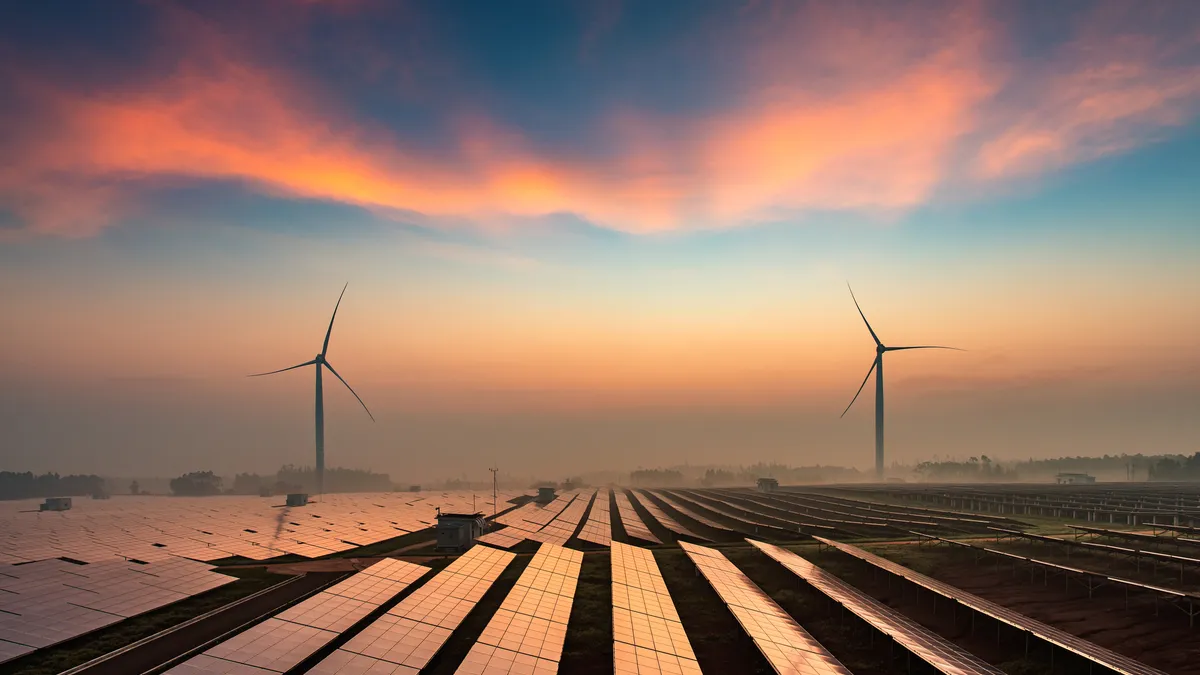Dive Brief:
- Virginia Democrats introduced a bill on Thursday to implement Democratic Gov. Ralph Northam's 100% carbon-free electricity by 2050 goal.
- The Virginia Clean Economy Act would commit the state to join the carbon cap-and-trade program, the Regional Greenhouse Gas Initiative, and enact an energy efficiency standard for long-term energy reduction. The bill was introduced by state Sen. Jennifer McClellan and Dels. Rip Sullivan, Jennifer Carroll Foy and Alfonso Lopez.
- On Tuesday, Maryland Republican Gov. Larry Hogan announced a state plan for 100% clean energy by 2040. He will submit the plan to the Democrat-controlled state legislature in the 2020 session once it convenes on Jan. 8.
Dive Insight:
States where legislatures are aligned with the governor on climate issues are advancing clean energy policies, garnering industry support from the clean energy sector.
"We are continuing to work with the industry to make sure that the structure of the renewable energy portfolio pieces of the program are the most effective means by which we can finance projects," J.R. Tolbert, managing director of Advanced Energy Economy (AEE), told Utility Dive.
AEE has focused on Virginia's efforts to introduce the sweeping energy bill this fall, and the legislation was developed to garner support from the renewable energy sector, Tolbert said, from rooftop solar to offshore wind, to onshore utility-scale renewables.
However, some clean energy advocates are criticizing the measures for not being more ambitious.
In Virginia, Food & Water Watch, a spinoff of the left-leaning advocacy group Public Citizen, said a strong climate bill would have included a moratorium on new fossil fuel projects, to block new gas plants and pipeline infrastructure such as the Mountain Valley Pipeline Southgate extension and the Transco Southeastern Trail Extension. Food & Water Watch - Virginia also opposed the failure to exclude nuclear energy from the state's Renewable Portfolio Standard and has disputed the emissions benefits from RGGI participation.
In Maryland, the Center for Climate Strategies published an analysis on Thursday of Hogan's clean electricity plan, saying it might "underestimate electricity emissions" by relying on 2017 data and needs carbon pricing policy options across sectors, among other "weaknesses."
The decarbonization strategy from Hogan's proposal "is contained in Maryland's 2019 draft Greenhouse Gas Emissions Reduction Act plan," Maryland Department of the Environment spokesperson Jay Apperson said in an email. The public had an opportunity to comment on it for the past two months and the administration is holding a series of open hearings through January.
Hogan's office said the plan would make Maryland the first state with incentives for carbon capture, utilization and storage, although some climate groups critique the technology for not yet being in practice or "reliably clean."
The Chesapeake Climate Action Network (CCAN), which opposed the inclusion of carbon capture in the Maryland plan, among other objections, asked for a meeting with the governor regarding the new proposal, Steven Hershkowitz, Maryland director of CCAN, told Utility Dive. The group will be reaching out for industry allies among the renewables sector, sustainable building developers in the public and private sector, and the electric transportation sector, he said.
"We're hoping we can drive more conversation," Hershkowitz said.















